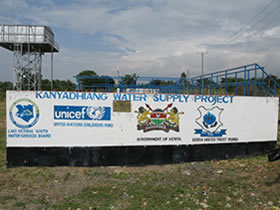Call for input: Development cooperation: reports
Issued by
Special Rapporteur on the rights to water and sanitation
Published
05 August 2016
presented to
the 71st and 72nd sessions of the GA
Issued by
Special Rapporteur on the rights to water and sanitation
Published
05 August 2016
presented to
the 71st and 72nd sessions of the GA
Issued by Special Procedures
Subject
Water and sanitation
Symbol Number
A/72/127
Issued by Special Procedures
Subject
Water and sanitation
Symbol Number
A/71/302

The Special Rapporteur on the human rights to safe drinking water and sanitation, Mr. Léo Heller, was mandated to work on identifying challenges and obstacles to the full realization of the rights, as well as protection gaps, good practices and enabling factors. He was also asked to monitor the way in which the human right to safe drinking water and sanitation is being realized throughout the world.
In 2016, the Special Rapporteur presented a report (A/71/302) on the subject of development cooperation and the human rights to water and sanitation to the United Nations General Assembly, at its 71st session. The first report provided a preliminary analysis of the issue, addressing funders’ human rights approaches, the evolution of development cooperation in the sector and trends in funding patterns.
On 23 October 2017, the Special Rapporteur presented his second report on the human rights to water and sanitation in development cooperation (A/72/127) to the 72nd session of the General Assembly.
On the basis of the theoretical framework developed in the first report, in the second report, the Special Rapporteur examined how funders contribute to the realization of the human rights to water and sanitation through an empirical analysis of a sample of six case studies. These studies involved six funders: France and Japan (State funders), the European Union (a regional integration organization), the World Bank and the Inter-American Development Bank (international financial institutions) and UNICEF (a United Nations agency).
This sample considered the types and regional balance of funders and their activities, as well as the relevance of funders as in the water and sanitation sector through development cooperation. Read the full briefs below.
The Special Rapporteur prepared a summary brief on each of the funders involved in the second report. Each brief was reviewed by the respective funder and incorporates their comments when appropriate.
The funder briefs reflect the analytical framework that was developed for data collection and analysis in the research, namely the “human rights development cycle”, illustrated below.

Contents of the funder briefs:
See the funder briefs in full: France, Japan, World Bank, IDB, European Union, UNICEF.
On 24 and 25 May 2017, the Special Rapporteur convened an expert consultation on the human rights to water and sanitation in development cooperation.
Questionnaires
As part of the primary consultation process, the Special Rapporteur invited States, intergovernmental organizations, national and international non-governmental organizations, national human rights institutions, United Nations agencies and entities, academia and all other interested stakeholders to contribute their views and perspectives on this subject in writing through a questionnaire.
Questionnaires on gender equality and on development cooperation were shared and input requested by 31 January 2016 (English | French | Spanish).
Member States
NGOs and Civil Society Organizations